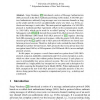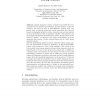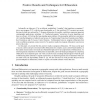25 search results - page 5 / 5 » Towards Plaintext-Aware Public-Key Encryption Without Random... |
SCN
2010
Springer
13 years 5 months ago
2010
Springer
Serge Vaudenay [20] introduced a notion of Message Authentication (MA) protocols in the Short Authenticated String (SAS) model. A SAS-MA protocol authenticates arbitrarily long mes...
EUROCRYPT
2003
Springer
14 years 19 days ago
2003
Springer
Abstract. Digital Signatures emerge naturally from Public-Key Encryption based on trapdoor permutations, and the “duality” of the two primitives was noted as early as Diffie-He...
ASIACRYPT
2001
Springer
13 years 12 months ago
2001
Springer
In this paper we formalize the notion of a ring signature, which makes it possible to specify a set of possible signers without revealing which member actually produced the signatu...
EUROCRYPT
2004
Springer
14 years 24 days ago
2004
Springer
Informally, an obfuscator O is an efficient, probabilistic “compiler” that transforms a program P into a new program O(P) with the same functionality as P, but such that O(P)...
IWSEC
2009
Springer
14 years 1 months ago
2009
Springer
Abstract—Password-authenticated key exchange (PAKE) protocols are designed to be secure even when the secret key used for authentication is a human-memorable password. In this pa...



